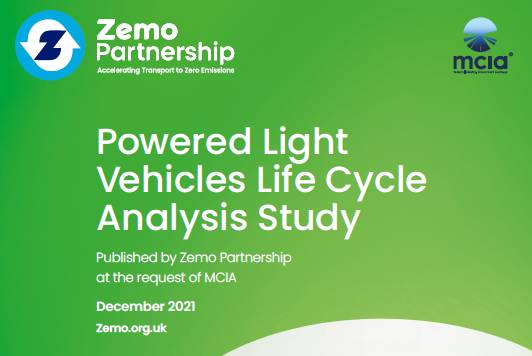Powered light vehicles can enable transport decarbonisation: Life-cycle analysis shows lighter vehicles can enhance contribution of electrification to climate goals

A new study from transport decarbonisation specialists, Zemo Partnership, uses life-cycle analysis (LCA) to compare the greenhouse gas emissions performance of powered light vehicles (PLV), including powered two wheelers (PTWs), with larger vehicles which have traditionally been used for a range of operational and leisure purposes, focusing mainly on urban areas.
Zemo’s study, commissioned by the Motorcycle Industry Association (MCIA), the representative body for powered two, three and four-wheeled light vehicles, assessed eight typical use cases where PLVs could replace traditional cars and vans. The work considered both traditional ICE (combustion engine) vehicles and BEV (battery electric) versions.
The research found that:
- In almost every use case, where the load requirements enable use of a PLV, substantial greenhouse gas (GHG) emission savings were delivered.
- There are significant GHG gains to be had by moving to smaller and lighter vehicles, combined with progressive electrification.
- Significant benefits can be gained by using electric zero emission PLVs which require smaller batteries, have lower GHG production impacts and lower energy requirements in use.
- In higher mileage applications, the benefits of zero tailpipe emissions operation are amplified even using today’s grid electricity, but for very low mileage use the embedded GHG of a BEV means battery size is critical
- The biggest savings can be seen when using electric PLVs for intensive commercial operations such as scooter delivery or urban parcel delivery operations, or heavy commuting use.
MCIA CEO, Tony Campbell, said: “Our sector has always been a staunch advocate of the right vehicle for the right journey approach. Today’s findings show why giving road users access to a variety of transport solutions that satisfy a particular need at a particular time, is and must be the way forward. We’re looking forward to continuing our work with the Government on finalising our sector’s ‘Action Plan’ and remain steadfast in ensuring its full and proper implementation next year.”
Commenting, Andy Eastlake, Zemo Partnership CEO, said: “There’s a great opportunity to decarbonise transport through the use of smaller lighter vehicles and to multiply the gains we can achieve through electrification. We should embrace PLVs as a key part of the spectrum of road transport solutions, which of course range from active, shared and public transport, through to cars, vans and HGVs.
Detailed life-cycle assessment is a fundamental consideration in the context of transport decarbonisation but is critically dependent on the assumptions around vehicle lifetime, mileage and battery replacement as well as the rate of decarbonisation of the electricity grid over time. Hopefully this new study begins to inform that discussion and paves the way for our ongoing work with Government and the MCIA”
Further information is included in the study which can be downloaded here.
Notes for Editors:
MCIA represents over 90% of the supply side of the industry; the manufacturers and importers of Powered Two Wheelers (PTWs) and other PLVs (or L-Category vehicles), accessory and component suppliers and companies providing associated services. For more information about MCIA or to interview Tony Campbell, CEO, please call 07795 844779 or email t.campbell@mcia.co.uk.
Zemo Partnership (www.zemo.org.uk). was established in 2003 (as LowCVP) as a public-private partnership working to accelerate a sustainable shift to lower and zero carbon vehicles and fuels and create opportunities for UK businesses. Zemo is a not-for-profit, independent partnership, jointly funded by the Government and its members, whose breadth of backgrounds and perspectives make the Partnership unique. For more information about Zemo Partnership or to interview Andy Eastlake, CEO, please contact 07976 363283 or email andy.eastlake@zemo.org.uk.
Follow us on Twitter: @MCIATweets @Zemo_org
- Life cycle analysis (LCA) is the holistic approach of analysing a product’s full environmental impact, from product creation, to in use operation, to eventual disposal.
- Examples and definitions of the different L-Category Vehicles (L1 to L7) can be found here.
For further information, please contact:
Alfie Brierley, Head of Policy and Public Affairs. A.brierley@mcia.co.uk M: 07590168714
Neil Wallis, Head of Communications. neil.wallis@zemo.org.uk M: 07974 255720
